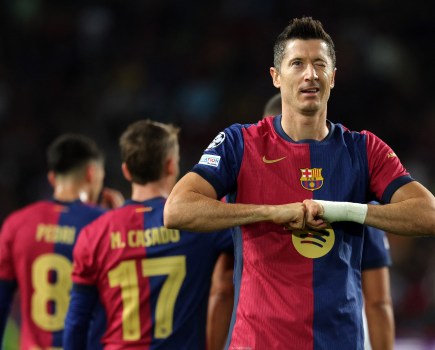Zinedine Zidane always knew he could never cruise through his long-awaited transfer to Spanish champions Real Madrid.
The World Player of the Year has been under siege ever since whispers emerged back in May that he was preparing to leave Juventus for the eight-times European club champions.
First, Zidane was pursued by reporters, photographers and agents throughout his Pacific island holiday. Then, even in private, his holiday peace was broken by a plethora of telephone calls concerning the final stages of the secretive negotiations.
When France’s 1998 World Cup-winning hero eventually returned to Europe, he was swamped within the circus demanded of the player who was costing his new club a world-record œ47million.
At least, at the Estadio Bernabeu, Zidane has a team-mate who knows exactly how it feels. Luis Figo underwent all the high-pressure hype a year ago when he cost Madrid the previous world record, œ37.5m.
If anything, Figo had it even tougher since he joined Madrid from deadly enemies Barcelona. Life out on the pitch has not been much fun for either of them this summer. Zidane joined Figo and co for a two-week warm-up in Switzerland, where the top Spanish clubs traditionally now get their act together.
But once the serious action began – prestige international friendlies – the mood changed. First Madrid lost 1-0 to Egypt’s top club, Al Ahly, in a match in Cairo that was anything but friendly in front of a capacity 70,000 crowd.
Then they returned to Spain to finish ‘only’ runners-up in the Trofeo Teresa Herrera – the most important of the multiplicity of Spanish pre-season tournaments. Madrid lost 2-1 to hosts Deportivo La Coruna in the Final despite having taken the lead through Figo.
Zidane had a quiet evening and barely appeared to raise his game even after Depor hit back through Dutchman Roy Makaay and Diego Tristan. ‘Friendlies’ these matches may have been in theory but not to the Madrid fans, who believe that Figo’s partnership with Zidane presages an all-conquering era to compare with that inspired by the legendary Alfredo Di Stefano and Ferenc Puskas back in the late 1950s and early 1960s.
Figo, Portugal’s finest footballer, who can alternate as playmaker or orthodox right winger, is current European Footballer of the Year; Zidane is reigning FIFA World Player of the Year. Figo, whatever the teething problems, still believes they can lift Madrid to a record-extending ninth European Champions Cup.
Triumph at Hampden Park next May would be doubly appropriate; after all, it was at Hampden in 1960 that Di Stefano’s team achieved their greatest victory – by 7-3 over Eintracht Frankfurt.
Next spring, Madrid will celebrate their centenary. As Figo says: ‘Everything is coming together just right. It’s a big year for the club and winning the Champions League will be tough. But we believe winning in Glasgow is a sort of destiny.’
Not that Figo ever expected Zidane’s adaptation to be a simple process, and mutterings on the return from La Coruna centred on whether Zidane had to adapt to the team (coach Vicente Del Bosque’s stated view) or whether the team should adapt to Zidane.
Either way, as Figo says: ‘Regaining the Champions Cup is not going to be easy.
‘At least I think it’s impossible to imagine the club could have done any better in strengthening the squad. At this level it’s not enough just to sign new players; they have to beplayers who make a difference – especially for us in a very significant season with the club’s birthday coming up.’
Figo, leaning on his own experience, believes the weight of the world-record transfer fee is the least of the problems with which Zidane will be concerned.
President Florentino Perez is the business man, insists Figo, while he is ‘merely’ a footballer. ‘Our president has always said it was his intention to sign the world’s best players – and he believes it makes good business sense. If we win trophies then I suppose we draw more fans and the club is more successful commercially. But it’s not up to me to do the sums.
‘In fact, all footballers who are transferred for big sums will tell you the same thing. I really did not think much about the size of the transfer fee when I left Barcelona because it was all down to market forces, not me. When you run out to play, it doesn’t cross your mind. It will be the same forZidane as it was for me – and as it will be for someone else next year, I expect.’
Not that Madrid always get theirman. Figo was disappointed personally that Portugal team-mate Rui Costa decided Milan was a better option than Madrid when it became imperative that bankruptcy-threatened Fiorentina sell him off to the highest bidder.
Figo and Rui Costa are not merely national team colleagues but old friends. Figo says: ‘I would have been thrilled to play alongside Rui Costa at Madrid. I am sure he will win things with Milan. I just wish he could have won things with Madrid, instead.
‘But I understand why he decided to stay in Italy. When I left Barcelona, staying in Spain was an important factor in my decision to join Madrid. I did not have to change country or learn a new language, adopt a different sort of lifestyle, and so on.
‘Also, I know the Spanish League very well and I feel at home playing in it. There was interest from clubs in Italy and England, I believe. But I’ve never been attracted by the way they play in Italy. Staying in Spain was always my preference.’
Figo has always remained reticent about his decision to quit Barcelona, where he had established himself as one of the finest wingers in the world, as club captain and as a dedicated winner of prizes.
Basically, his departure was provoked by the power vacuum at Camp Nou after Josep Luis Nunez stepped down as president but before Joan Gaspart had been voted in as successor.
As Figo tells it, his advisers told Nunez there were other offers, but he responded that he had renegotiated the player’s contract the previous year and would not do soagain.
Anyway, since he was standing down as president, he had no real say in the matter. Madrid came along, comparatively late in the proceedings, and the rest, as they say, is football history.
Figo concedes: ‘Some of the fans here were not too sure about their club signing a player from their biggest rivals. Fortunately, we had a great season and won the League title for the first time in four years. Now, I think, everyone can say it was good business.’
That’s all Madrid and their fans want to say about the Zidane deal this time nextyear.







